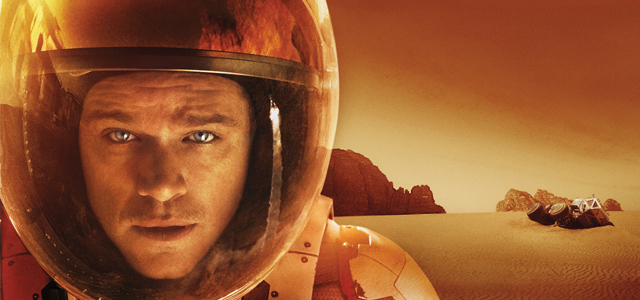The Martian is more than a brilliant science fiction yarn; it’s the fantasy story that shouldn’t exist. As a novel, publishers rejected it so many times that author Andy Weir ended up giving it away online. Now, it’s a major motion picture at a cinema near you. Which goes to show, just because those who should know better don’t recognise the truth, doesn’t mean it isn’t true. Something worth remembering when it comes to spotting God in The Martian.
On screen, The Martian stars Matt Damon as astronaut Mark Watney, an engineer attached to the third manned mission to Mars somewhere in humanity’s not-too-distant future. His crew has only been on the surface of the planet a few days when a fierce dust storm forces their mission to be scrubbed.
However, Watney is swept away by flying debris, leading his comrades to believe his heart has stopped. They blast off without him… but Mark isn’t dead. He wakes up half buried in sand and realises he is alone on a hostile planet. Armed with only today’s science and the will to live, Watney has to find a way to survive for four years before any rescue attempt can reach him – assuming he finds a way to let earth know he’s still alive.
The Martian’s focus is split between Watney’s inspired survival efforts and the worldwide effort to secure his rescue. The result is a thrilling ride filled with geeky science that advances a believable theory about what it means to be truly human. Though at times we might be desperately selfish, The Martian suggests humanity is ultimately a social species that values the life of every individual.
Watney, and the world reaching out for him, realises that even if he is able to find a way to survive indefinitely on Mars, it won’t amount to life as it was meant to be. In Genesis 2 we listen in on our Creator’s conversation and learn, “It is not good that man should be alone.” (Genesis 2:18, NKJV)
It’s this axiom, and the subsequent struggle to bring Mark home, that makes a two-hour exercise in practical science such an inspiring and encouraging tale.
With The Martian movie presenting such compelling results on-screen, how could professional publishers have got it so wrong and rejected Weir’s tale? They missed the success story under their noses because they couldn’t see the truth behind the equations. It’s the same reason most people will miss God’s presence in this production.
On the whole, The Martian is presented as a triumph of scientific rationalism that might even suggest there is no need for a god to pray to. Yet in the middle of a story that celebrates human ingenuity and the power of the human spirit, we still make room for the hand of God. The sheer number of “lucky breaks” Watney benefits from amount to a silent argument there is someone moving behind the scenes.
We may write about how high the human spirit can rise but God’s presence and His thinking continue to shape our stories. A truly atheistic version of The Martian would have left Mark to die alone. He is only one man and the billions spent trying to engineer his safe return could logically save the lives of millions. There is, after all, no sympathy in a world with a purely evolutionary outlook.
Yet The Martian routinely makes space for repeated doses of luck because we recognise Mark’s ingenuity isn’t enough to guarantee his survival. And those who long for his safe return unconsciously reflect the value our heavenly Father places on every human being:
“‘For I have no pleasure in the death of anyone,’ declares the Lord God; ‘So turn, and live.’” (Ezekiel 18:32, ESV)
Mark Hadley













